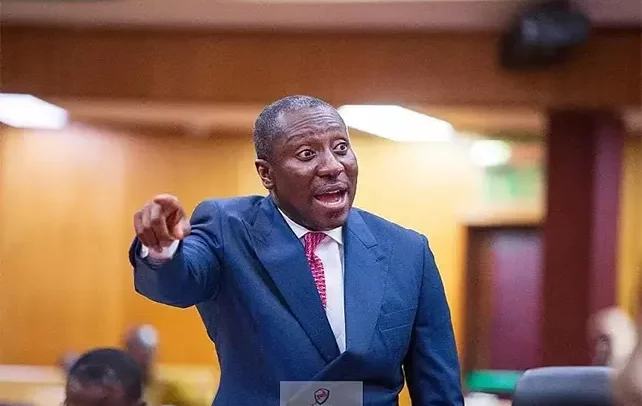Alexander Afenyo-Markin
The Minority in Parliament has described the High Court decision ordering a re-run of the entire Kpandai parliamentary election as not only flawed but “dangerous,” warning that it poses a serious threat to the nation’s constitutional democracy and the sovereignty of voters.
Addressing the press in Parliament on Wednesday, the Minority Leader, Alexander Afenyo-Markin, said the judgment undermines justice rather than advancing it, and pledged that the Minority would challenge it through every lawful means available.
“This judgment does not uphold constitutionalism; it undermines it. It does not protect the people; it punishes them without cause,” he declared.
He further assured that the Member of Parliament for the Kpandai Constituency, Matthew Nyindam, remains the duly elected representative and a full member of the House until all legal processes are exhausted.
“No premature exclusion will be tolerated,” he stressed, adding that the Caucus fully supports an appeal and an application for stay of execution.
According to the Minority Leader, the High Court, presided over by Justice Emmanuel Bart-Plange Brew, breached constitutional safeguards, particularly Article 42, by effectively annulling valid votes in 111 polling stations where no irregularities were alleged or proven.
He warned that the ruling sets a perilous precedent that could encourage electoral sabotage and litigation-driven re-runs across the country.
Recounting the background to the dispute, Mr. Afenyo-Markin explained that following the December 2024 parliamentary elections, Mr. Nyindam was duly declared winner for the Kpandai Constituency after what he described as a peaceful and orderly process.
His opponent subsequently filed a petition alleging irregularities in 41 polling stations and accordingly requested re-runs in only those affected centres.
However, in a move the Minority says “defies ordinary legal reasoning,” the High Court ordered a complete re-run of the election across all 152 polling stations within 30 days.
Even more troubling, the order was issued without a full written judgment, factual findings, or detailed legal reasoning.
Mr. Afenyo-Markin, a legal practitioner, said while courts may occasionally deliver rulings with reasons to follow, such a practice should never apply where the stakes involve a parliamentary seat and the constitutional right of thousands of voters. He described the directive as “judicial irresponsibility of the highest order.”
The Minority further faulted the court’s reliance on the doctrine that allows judges, in limited circumstances, to grant relief not specifically sought by a party.
Citing the Supreme Court decision in Kojo Baah v Ghana Water Company Limited & Another, he argued that the strict conditions for applying that principle were completely absent in the Kpandai case, since the petition neither pleaded nor led evidence on the entire constituency.
Even if irregularities had been assumed, he maintained that the wholesale re-run remains unconstitutional under Section 20 of PNDCL 284, which requires that any voiding of results be limited strictly to proven non-compliance that affects the outcome. “What we witnessed was not a surgical legal remedy but judicial carpet-bombing,” he said.
Beyond the legal issues, the Minority warned of the broader democratic implications, arguing that the ruling could embolden disruptive actors to manufacture confusion in a few polling stations in the hope of triggering full re-runs.
In a message of reassurance to the people of Kpandai, Mr. Afenyo-Markin urged calm and steadfast faith in the democratic process.
He said the law would ultimately vindicate their votes and their choice of representative. “Their loyalty to the Republic will not be betrayed by one reckless judicial act,” he assured.
The Minority Caucus concluded that while it respects the judiciary, it would not remain silent in the face of what it termed a grave constitutional error, insisting that the integrity of Ghana’s electoral system and democracy must be defended “by law, by Constitution, and by truth.”
By Ernest Kofi Adu, Parliament House


